Shell Class Reference
#include <Shell.h>

Public Member Functions | |
| Shell () | |
| ~Shell () | |
| string | doVersion () |
| string | doRevision () |
| void | setCwe (ObjId cwe) |
| ObjId | getCwe () const |
| bool | isRunning () const |
| Id | doCreate (string type, ObjId parent, string name, unsigned int numData, NodePolicy nodePolicy=MooseBlockBalance, unsigned int preferredNode=1) |
| bool | doDelete (ObjId oid) |
| ObjId | doAddMsg (const string &msgType, ObjId src, const string &srcField, ObjId dest, const string &destField) |
| void | doQuit () |
| void | doStart (double runtime) |
| void | doNonBlockingStart (double runtime) |
| void | doReinit () |
| void | doStop () |
| void | doTerminate () |
| void | doMove (Id orig, ObjId newParent) |
| Id | doCopy (Id orig, ObjId newParent, string newName, unsigned int n, bool toGlobal, bool copyExtMsgs) |
| ObjId | doFind (const string &path) const |
| void | doUseClock (string path, string field, unsigned int tick) |
| Id | doLoadModel (const string &fname, const string &modelpath, const string &solverClass="") |
| void | doSaveModel (Id model, const string &fileName, bool qflag=0) const |
| int | doWriteSBML (const string &fname, const string &modelpath) |
| Id | doReadSBML (const string &fname, const string &modelpath, const string &solverclass="") |
| void | doSyncDataHandler (Id tgt) |
| void | doReacDiffMesh (Id baseCompartment) |
| void | doSetParserIdleFlag (bool isParserIdle) |
| void | start (double runTime) |
| void | initAck () |
| void | waitForAck () |
| void | handleAck (unsigned int ackNode, unsigned int status) |
| bool | isAckPending () const |
| void | handleQuit () |
| void | handleCreate (const Eref &e, string type, ObjId parent, Id newElm, string name, NodeBalance nb, unsigned int parentMsgIndex) |
| void | destroy (const Eref &e, ObjId oid) |
| void | innerCreate (string type, ObjId parent, Id newElm, string name, const NodeBalance &nb, unsigned int parentMsgIndex) |
| bool | innerCopy (const vector< ObjId > &args, const string &newName, unsigned int n, bool toGlobal, bool copyExtMsgs) |
| Does actual work of copying. Returns true on success. | |
| const Msg * | innerAddMsg (string msgType, ObjId src, string srcField, ObjId dest, string destField, unsigned int msgIndex) |
| void | handleAddMsg (const Eref &e, string msgType, ObjId src, string srcField, ObjId dest, string destField, unsigned int msgIndex) |
| bool | innerMove (Id orig, ObjId newParent) |
| void | handleMove (const Eref &e, Id orig, ObjId newParent) |
| void | handleSync (const Eref &e, Id elm, FuncId fid) |
| void | handleCopy (const Eref &e, vector< ObjId > args, string newName, unsigned int n, bool toGlobal, bool copyExtMsgs) |
| bool | innerUseClock (string path, string field, unsigned int tick, unsigned int msgIndex) |
| void | handleUseClock (const Eref &e, string path, string field, unsigned int tick, unsigned int msgIndex) |
| void | addClockMsgs (const vector< ObjId > &list, const string &field, unsigned int tick, unsigned int msgIndex) |
| void | doSetClock (unsigned int tickNum, double dt) |
| void | warning (const string &text) |
| void | error (const string &text) |
| void | setShellElement (Element *shelle) |
| const ProcInfo * | getProcInfo (unsigned int index) const |
| void | expectVector (bool flag) |
Static Public Member Functions | |
| static void | clearRestructuringQ () |
| static void | dropClockMsgs (const vector< ObjId > &list, const string &field) |
| static void | setHardware (unsigned int numCores, unsigned int numNodes, unsigned int myNode) |
| static unsigned int | myNode () |
| static unsigned int | numNodes () |
| static unsigned int | numCores () |
| static unsigned int | numProcessThreads () |
| static void | loadBalance () |
| static void | launchParser () |
| static bool | inBlockingParserCall () |
| static bool | isSingleThreaded () |
| static bool | keepLooping () |
| static bool | isParserIdle () |
| static void | launchThreads () |
| static unsigned int | reduceInt (unsigned int val) |
| static const Cinfo * | initCinfo () |
| static bool | adopt (ObjId parent, Id child, unsigned int msgIndex) |
| static bool | adopt (Id parent, Id child, unsigned int msgIndex) |
| Adaptor for above function. Also static function. | |
| static const ProcInfo * | procInfo () |
| Static func for returning the ProcInfo of the shell. | |
| static bool | chopString (const string &path, vector< string > &ret, char separator= '/') |
| static bool | isNameValid (const string &name) |
| static bool | chopPath (const string &path, vector< string > &ret, vector< unsigned int > &index) |
| static void | cleanSimulation () |
Static Public Attributes | |
| static const unsigned int | OkStatus = ~0 |
| static const unsigned int | ErrorStatus = ~1 |
Constructor & Destructor Documentation
| Shell::Shell | ( | ) |
| Shell::~Shell | ( | ) |
Member Function Documentation
| void Shell::addClockMsgs | ( | const vector< ObjId > & | list, | |
| const string & | field, | |||
| unsigned int | tick, | |||
| unsigned int | msgIndex | |||
| ) |
Utility function to set up messages to schedule a list of Ids using the specified field and tick
Static utility function. Attaches child element to parent element. Must only be called from functions executing in parallel on all nodes, as it does a local message addition MsgIndex is needed to be sure that the same msg identifies parent-child connection on all nodes.
References Finfo::addMsg(), ObjId::element(), Id::element(), ObjId::eref(), Cinfo::findFinfo(), Element::getName(), initCinfo(), and Msg::mid().
Referenced by adopt(), buildFinfoElement(), init(), Msg::initMsgManagers(), innerCopyElements(), Cinfo::makeCinfoElements(), testSetGetExtField(), and testStrSet().
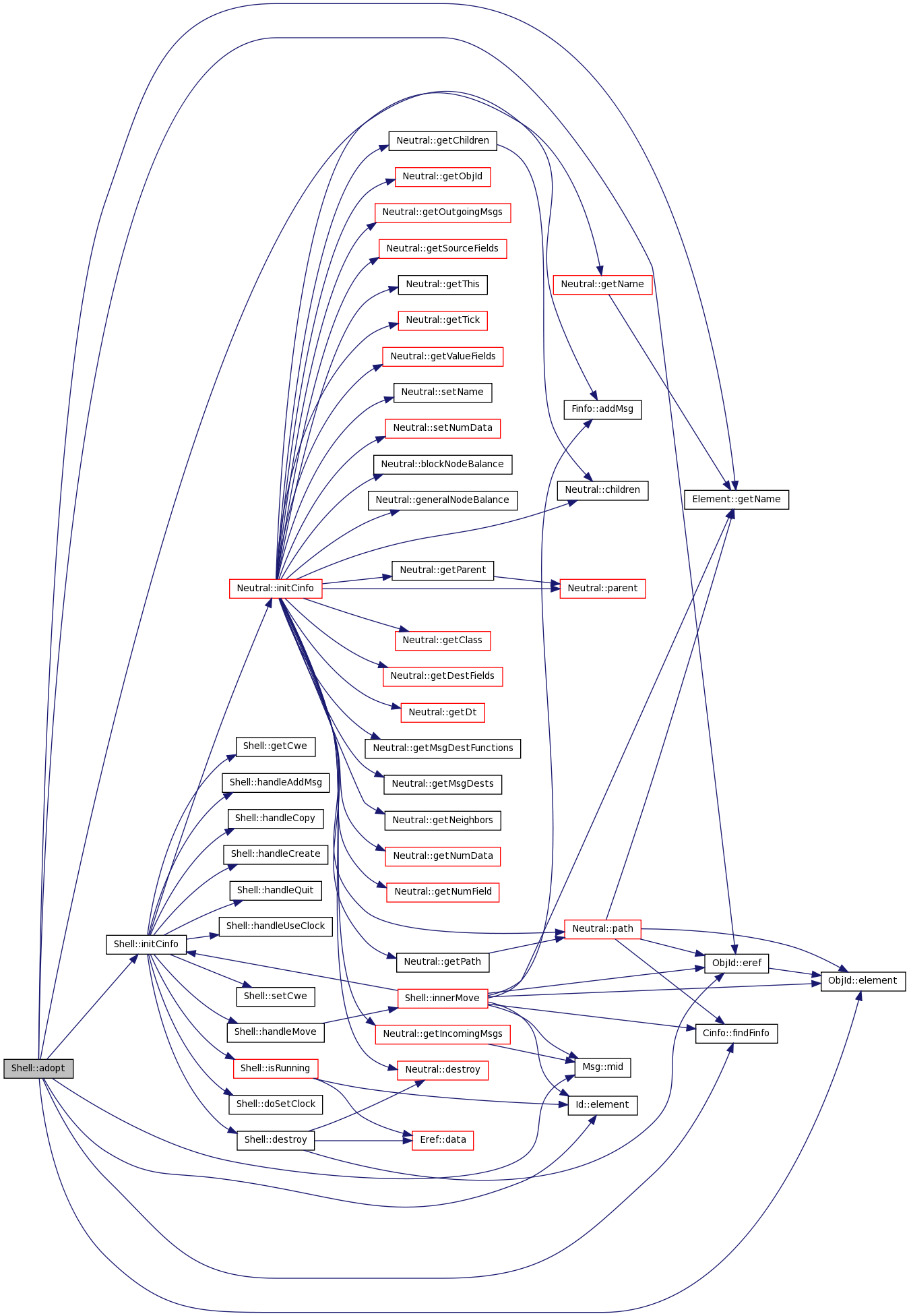
| static bool Shell::chopPath | ( | const string & | path, | |
| vector< string > & | ret, | |||
| vector< unsigned int > & | index | |||
| ) | [static] |
Chop up the path into a vector of Element names, and also fills out a matching vector of indices. If at any level of the path there are no indices or the index is zero, the index entry * remains empty. Otherwise the entry contains a vector with index values for this level of the path. The zeroth position of this index vector is the slowest varying, i.e., most significant. Returns true if it starts at '/'.
Example: /foo/bar[10]/zod[3][4][5] would return: ret: {"foo", "bar", "zod" } index: { {}, {10}, {3,4,5} }
Referenced by testChopPath().
| static bool Shell::chopString | ( | const string & | path, | |
| vector< string > & | ret, | |||
| char | separator = '/' | |||
| ) | [static] |
Chops up the names in the string into the vector of strings, using the specified separator. Returns true if it is an absolute path, that is, starts with the separator.
Referenced by simpleWildcardFind(), and testChopString().
| void Shell::cleanSimulation | ( | ) | [static] |
Cleans up all Elements except /root itself, /clock, /classes, and /Msgs. In due course will also do suitable reinitialization of tick and other values.
References Neutral::children(), Eref::data(), and doDelete().

| static void Shell::clearRestructuringQ | ( | ) | [static] |
Works through internal queue of operations that modify the structure of the simulation. These operations have to be carefully separated from any other functions or messaging, so this happens while all other threads are blocked.
References Eref::data(), Neutral::destroy(), ObjId::eref(), and ObjId::id.
Referenced by initCinfo().
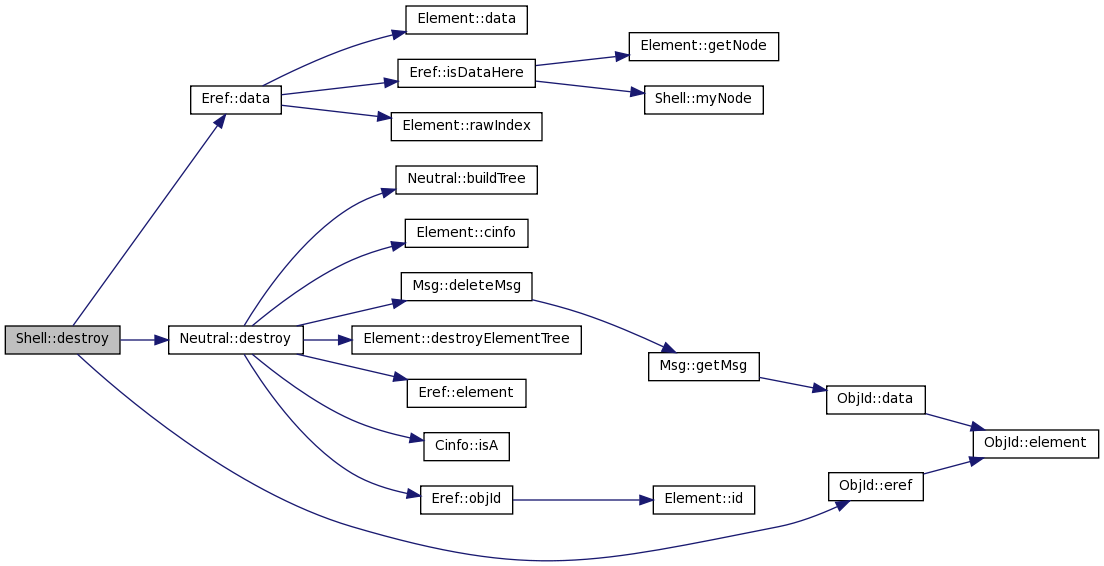
| ObjId Shell::doAddMsg | ( | const string & | msgType, | |
| ObjId | src, | |||
| const string & | srcField, | |||
| ObjId | dest, | |||
| const string & | destField | |||
| ) |
Sets up a Message of specified type. Later need to consider doing this through MsgSpecs only. Here the 'args' vector handles whatever arguments we may need to pass to the specified msgType.
Referenced by benchmarkMsg(), ReadSwc::build(), ReadCspace::expandEnzyme(), ReadCspace::expandReaction(), makeCompt(), ReadCspace::makePlots(), makeReacTest(), testAssortedMsg(), testClock(), testCopyMsgOps(), testGetMsg(), testGetMsgs(), testMMenzProcess(), testMpiFibonacci(), testMsgElementListing(), testPoolVolumeScaling(), testReacVolumeScaling(), testShellAddMsg(), testStats(), and testTwoReacGetNeighbors().
| Id Shell::doCopy | ( | Id | orig, | |
| ObjId | newParent, | |||
| string | newName, | |||
| unsigned int | n, | |||
| bool | toGlobal, | |||
| bool | copyExtMsgs | |||
| ) |
Copies orig Element to newParent. n specifies how many copies are made. copyExtMsgs specifies whether to also copy messages from orig to objects outside the copy tree. Usually we don't do this.
Referenced by testCopy(), testCopyFieldElement(), testCopyMsgOps(), and testGetMsg().
| Id Shell::doCreate | ( | string | type, | |
| ObjId | parent, | |||
| string | name, | |||
| unsigned int | numData, | |||
| NodePolicy | nodePolicy = MooseBlockBalance, |
|||
| unsigned int | preferredNode = 1 | |||
| ) |
Create an Element. Returns its id. type: Specifies classname of Objects in Element. parent: Id of parent element name: Name to be used for identifying Element. numData: Size of array.
Referenced by ReadKkit::assignPoolCompartments(), benchmarkMsg(), ReadCspace::expandEnzyme(), ReadCspace::expandReaction(), makeCompt(), ReadCspace::makeMolecule(), ReadCspace::makePlots(), makeReacTest(), makeStandardElements(), setMethod(), testAssortedMsg(), testBuildStoich(), testChildren(), testClockMessaging(), testCopy(), testCopyFieldElement(), testCopyMsgOps(), testDescendant(), testFilterOffNodeTargets(), testFindModelParent(), testGetMsg(), testGetMsgs(), testInterNodeOps(), testMMenz(), testMMenzProcess(), testMove(), testMpiFibonacci(), testMsgElementListing(), testObjIdToAndFromPath(), testPoolVolumeScaling(), testReacVolumeScaling(), testReMesh(), testRunGsolve(), testRunKsolve(), testShellAddMsg(), testShellParserCreateDelete(), testShellParserStart(), testShellSetGet(), testStats(), testSyncSynapseSize(), testTable(), testTreeTraversal(), testTwoReacGetNeighbors(), testVolScaling(), and testWildcard().
| bool Shell::doDelete | ( | ObjId | oid | ) |
Delete specified Element and all its children and all Msgs connected to it. This also works for Msgs, which are also identified by an ObjId. Unlike regular objects, only the one Msg entry specified by the DataIndex part of the ObjId argument is deleted.
Referenced by benchmarkMsg(), cleanSimulation(), testAssortedMsg(), testBuildStoich(), testChildren(), testClockMessaging(), testCopy(), testCopyFieldElement(), testCopyMsgOps(), testDescendant(), testFilterOffNodeTargets(), testFindModelParent(), testGetMsg(), testGetMsgs(), testInterNodeOps(), testMMenz(), testMMenzProcess(), testMove(), testMsgElementListing(), testObjIdToAndFromPath(), testPoolVolumeScaling(), testReacVolumeScaling(), testReadKkit(), ReadCspace::testReadModel(), testReMesh(), testRunGsolve(), testRunKsolve(), testSetupReac(), testShellAddMsg(), testShellParserCreateDelete(), testShellSetGet(), testStats(), testSyncSynapseSize(), testTable(), testTreeTraversal(), testTwoReacGetNeighbors(), testVolScaling(), and testWildcard().
| ObjId Shell::doFind | ( | const string & | path | ) | const |
Looks up the Id specified by the given path. May include relative references and the internal cwe (current working Element) on the shell
Referenced by Id::Id(), and testTreeTraversal().
| Id Shell::doLoadModel | ( | const string & | fname, | |
| const string & | modelpath, | |||
| const string & | solverClass = "" | |||
| ) |
Loads in a model to a specified path. Tries to figure out model type from fname or contents of file. Currently knows about kkit, cspace. Soon to learn .p, SBML, NeuroML. Later to learn NineML
shifts orig Element (including offspring) to newParent. All old hierarchy, data, Msgs etc are preserved below the orig.
References Neutral::child(), Id::element(), ObjId::element(), ObjId::eref(), Element::getName(), Neutral::isDescendant(), ObjId::path(), and warning().
Referenced by ReadKkit::assignPoolCompartments(), ReadKkit::assignReacCompartments(), testMove(), and testObjIdToAndFromPath().
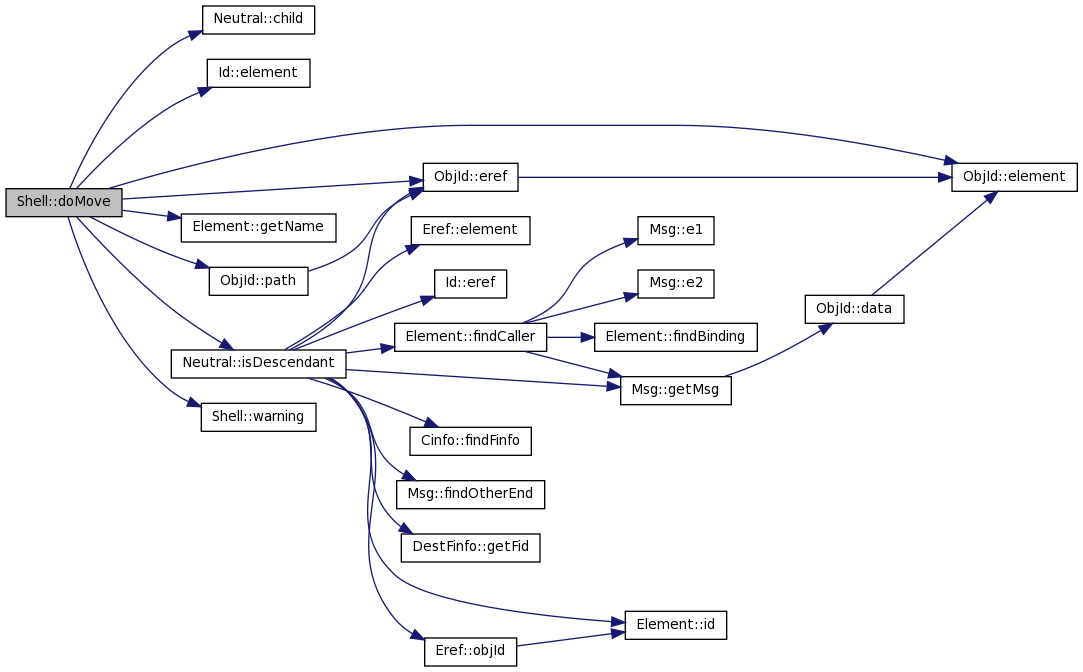
| void Shell::doNonBlockingStart | ( | double | runtime | ) |
Starts off simulation, to run for 'runtime' more than current time. This version returns at once, and the parser can go on to do other things. It has to check with the Shell::isRunning function (accessible as a MOOSE field) to find out if it is finished. Can call 'doStop', 'doTerminate' or 'doReinit' at any time to stop the run with increasing levels of prejudice.
| void Shell::doQuit | ( | ) |
Cleanly quits simulation, wrapping up all nodes and threads.
References logger, and SetGet0::set().
Referenced by launchParser(), main(), and testShellParserQuit().
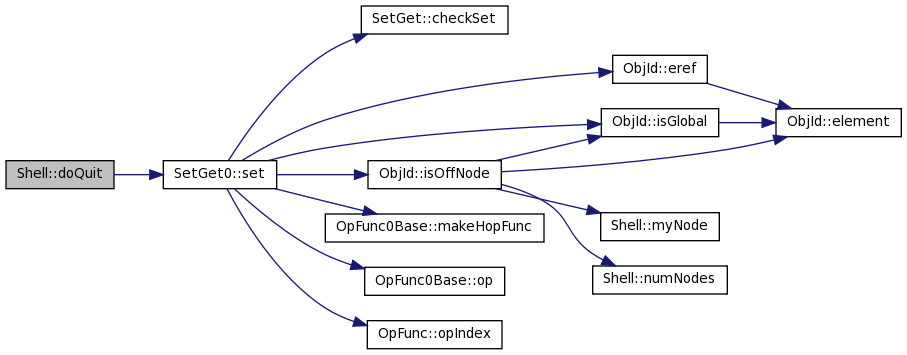
| void Shell::doReacDiffMesh | ( | Id | baseCompartment | ) |
| Id Shell::doReadSBML | ( | const string & | fname, | |
| const string & | modelpath, | |||
| const string & | solverclass = "" | |||
| ) |
| void Shell::doReinit | ( | ) |
Reinitializes simulation: time goes to zero, all scheduled objects are set to initial conditions. If simulation is already running, first stops it.
References logger, and SetGet0::set().
Referenced by benchmarkMsg(), ReadKkit::run(), testCopyMsgOps(), testGetMsg(), testMMenzProcess(), testRunGsolve(), testRunKsolve(), testSetupReac(), and testStats().
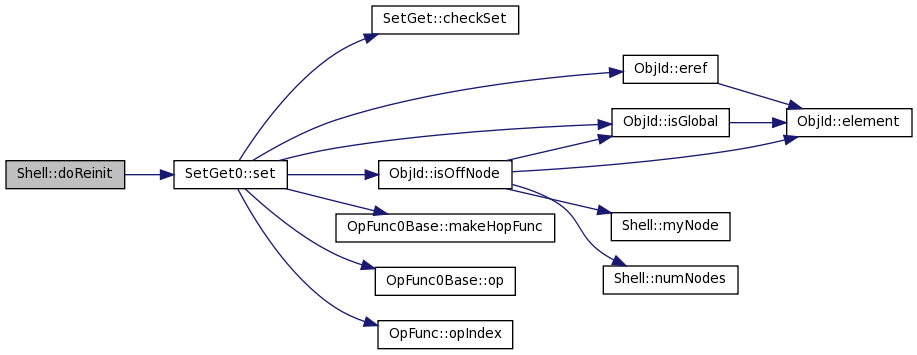
| string Shell::doRevision | ( | ) |
Returns SVN revision number of the software. This information is useful for developers. In release versions it defaults to "0".
References SVN_REVISION.
| void Shell::doSaveModel | ( | Id | model, | |
| const string & | fileName, | |||
| bool | qflag = 0 | |||
| ) | const |
Saves specified model to specified file, using filetype identified by filename extension. Currently known filetypes are: .g: Kkit model
Still to come: .p: GENESIS neuron morphology and channel spec file .sbml: SBML file .nml: NeuroML file .9ml: NineML file .snml: SigNeurML
| void Shell::doSetClock | ( | unsigned int | tickNum, | |
| double | dt | |||
| ) |
| void Shell::doSetParserIdleFlag | ( | bool | isParserIdle | ) |
This function is called by the parser to tell the ProcessLoop to wait a bit between cycles. Used when we are waiting for user input and there is no point in having the ProcessLoop go at full speed. When flag is true, then the ProcessLoop will sleep a bit, when false it will work at full speed.
| void Shell::doStart | ( | double | runtime | ) |
Starts off simulation, to run for 'runtime' more than current time. This version is blocking, and returns only when the simulation is done.
References logger.
Referenced by benchmarkMsg(), ReadKkit::run(), testCopyMsgOps(), testFibonacci(), testGetMsg(), testMMenzProcess(), testMpiFibonacci(), testRunGsolve(), testRunKsolve(), testSetupReac(), testShellAddMsg(), testShellParserStart(), and testStats().
| void Shell::doStop | ( | ) |
Cleanly stops simulation, ready to take up again from where the stop occurred. Waits till current operations are done.
References SetGet0::set().
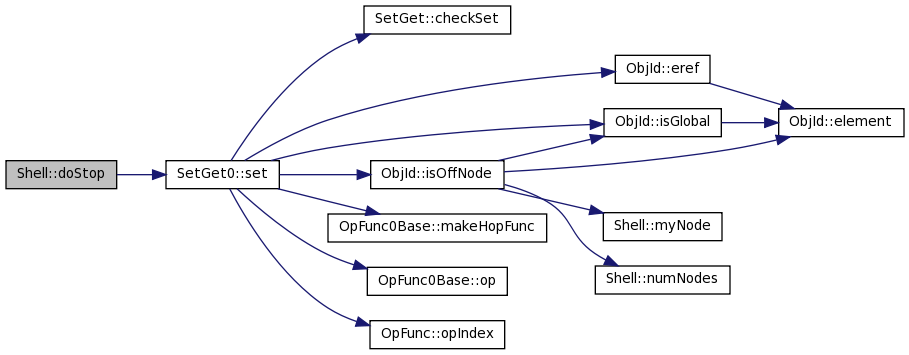
| void Shell::doSyncDataHandler | ( | Id | tgt | ) |
This function synchronizes fieldDimension on the DataHandler across nodes. Used after function calls that might alter the number of Field entries in the table.. The tgt is the FieldElement whose fieldDimension needs updating.
| void Shell::doTerminate | ( | ) |
Terminate ongoing simulation, with prejudice. Uncleanly stops simulation. Things may be in a mess with different objects at different times, but it stops at once.
| void Shell::doUseClock | ( | string | path, | |
| string | field, | |||
| unsigned int | tick | |||
| ) |
Deprecated. Fallback Find function which treats index brackets as part of name string, and does not try to extract integer indices. ObjId doFindWithoutIndexing( const string& path ) const; Connects up process messages from the specified Tick to the targets on the path. Does so for whole Elements, not individual entries in the Element array. The target on the path usually has the 'process' field but other options are allowed, like 'init'
Referenced by benchmarkMsg(), main(), setMethod(), testCopyMsgOps(), testGetMsg(), testMMenzProcess(), testMpiFibonacci(), testRunGsolve(), testRunKsolve(), testShellAddMsg(), testShellParserStart(), and testStats().
| string Shell::doVersion | ( | ) |
Returns version number of the software.
References MOOSE_VERSION.
| int Shell::doWriteSBML | ( | const string & | fname, | |
| const string & | modelpath | |||
| ) |
Write given model to SBML file. Returns success value.
| static void Shell::dropClockMsgs | ( | const vector< ObjId > & | list, | |
| const string & | field | |||
| ) | [static] |
Utility function to unschedule the specified elist operating on the specified field, typically 'process'
| void Shell::error | ( | const string & | text | ) |
| void Shell::expectVector | ( | bool | flag | ) |
set the gettingVector_ flag
| ObjId Shell::getCwe | ( | ) | const |
Returns the current working Element of the Shell
Referenced by initCinfo().
| const ProcInfo* Shell::getProcInfo | ( | unsigned int | index | ) | const |
| void Shell::handleAck | ( | unsigned int | ackNode, | |
| unsigned int | status | |||
| ) |
Generic handler for ack msgs from various nodes. Keeps track of which nodes have responded.
| void Shell::handleAddMsg | ( | const Eref & | e, | |
| string | msgType, | |||
| ObjId | src, | |||
| string | srcField, | |||
| ObjId | dest, | |||
| string | destField, | |||
| unsigned int | msgIndex | |||
| ) |
Connects src to dest on appropriate fields, with specified msgType. This wrapper function sends the ack back to the master node.
Referenced by initCinfo().
| void Shell::handleCopy | ( | const Eref & | e, | |
| vector< ObjId > | args, | |||
| string | newName, | |||
| unsigned int | n, | |||
| bool | toGlobal, | |||
| bool | copyExtMsgs | |||
| ) |
Deep copy of source element to target, renaming it to newName. The Args are orig, newParent, newElm where the newElm is the Id passed in for the root of the copy. All subsequent created Elements should have successive Ids. The copy may generate an array with n entries. Normally only copies msgs within the tree, but if the flag copyExtMsgs is true then it copies external Msgs too.
Referenced by initCinfo().
| void Shell::handleCreate | ( | const Eref & | e, | |
| string | type, | |||
| ObjId | parent, | |||
| Id | newElm, | |||
| string | name, | |||
| NodeBalance | nb, | |||
| unsigned int | parentMsgIndex | |||
| ) |
Referenced by initCinfo().
Handler to move Element orig onto the newParent.
References innerMove().
Referenced by initCinfo().
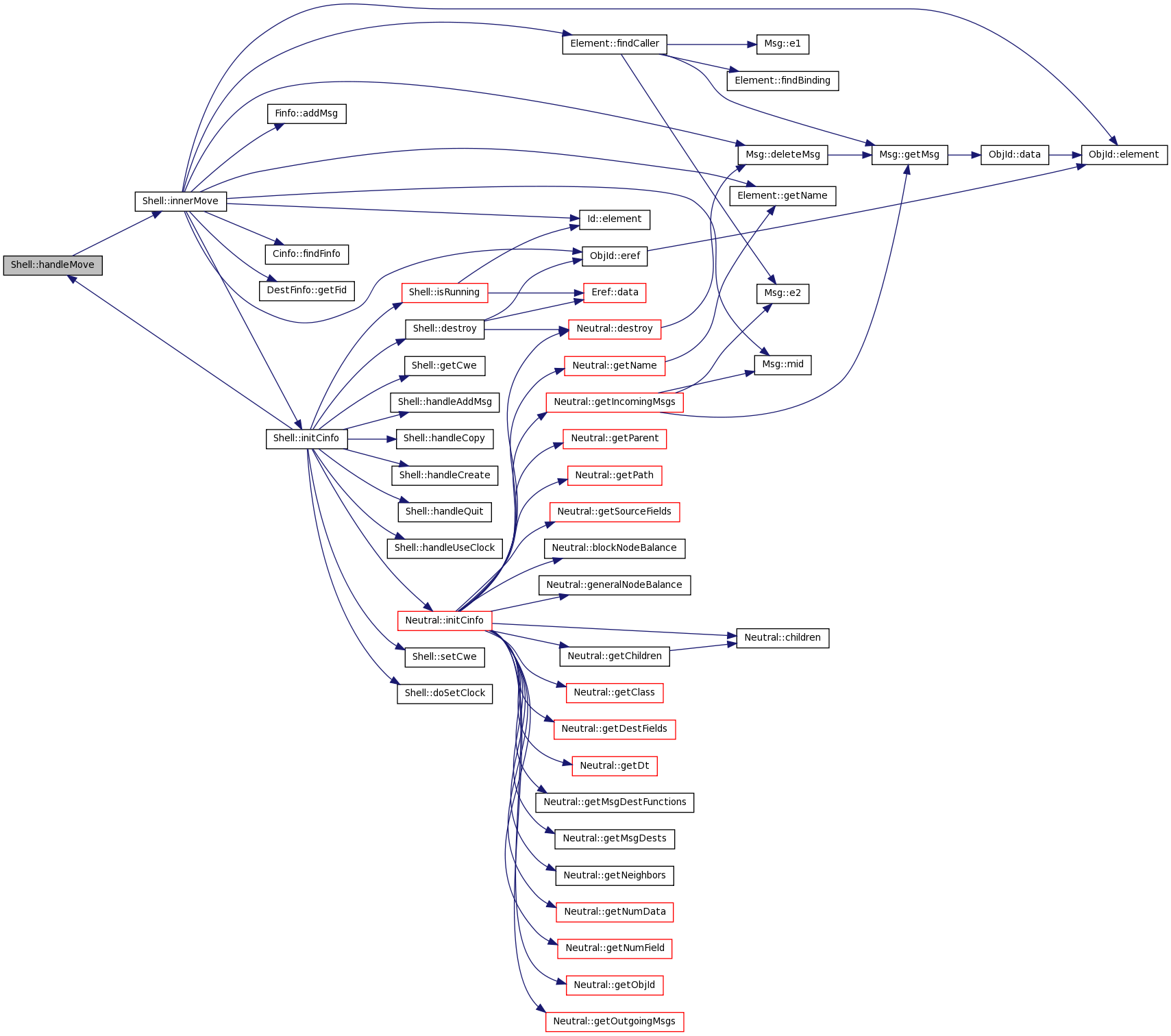
| void Shell::handleQuit | ( | ) |
Wraps up operations. Doesn't quit instantly, completes the current process cycle first.
Referenced by initCinfo().
Handles sync of DataHandler indexing across nodes
| void Shell::handleUseClock | ( | const Eref & | e, | |
| string | path, | |||
| string | field, | |||
| unsigned int | tick, | |||
| unsigned int | msgIndex | |||
| ) |
Referenced by initCinfo().
| bool Shell::inBlockingParserCall | ( | ) | [static] |
True when the parser is in a call which is being blocked because it requires the event loop to complete some actions.
| void Shell::initAck | ( | ) |
Initialize acks. This call should be done before the 'send' goes out, because with the wonders of threading we might get a response to the 'send' before this call is executed. This MUST be followed by a waitForAck call.
| const Cinfo * Shell::initCinfo | ( | ) | [static] |
References d, destroy(), doSetClock(), getCwe(), handleAddMsg(), handleCopy(), handleCreate(), handleMove(), handleQuit(), handleUseClock(), Neutral::initCinfo(), isRunning(), logger, and setCwe().
Referenced by adopt(), init(), and innerMove().
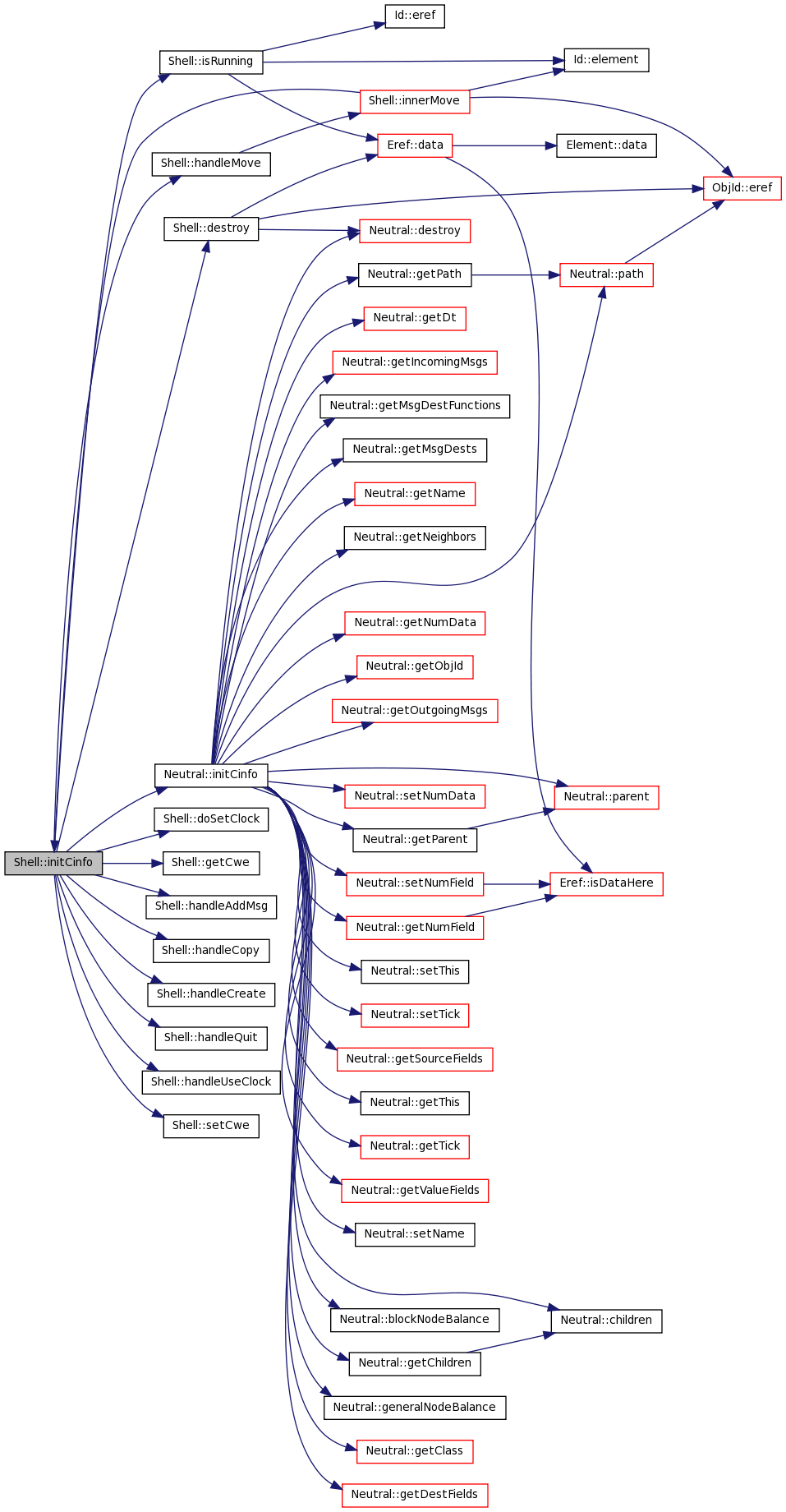
| const Msg* Shell::innerAddMsg | ( | string | msgType, | |
| ObjId | src, | |||
| string | srcField, | |||
| ObjId | dest, | |||
| string | destField, | |||
| unsigned int | msgIndex | |||
| ) |
Connects src to dest on appropriate fields, with specified msgType. This inner function does NOT send an ack. Returns true on success
| bool Shell::innerCopy | ( | const vector< ObjId > & | args, | |
| const string & | newName, | |||
| unsigned int | n, | |||
| bool | toGlobal, | |||
| bool | copyExtMsgs | |||
| ) |
Does actual work of copying. Returns true on success.
| void Shell::innerCreate | ( | string | type, | |
| ObjId | parent, | |||
| Id | newElm, | |||
| string | name, | |||
| const NodeBalance & | nb, | |||
| unsigned int | parentMsgIndex | |||
| ) |
Function that does the actual work of creating a new Element. The Class of the Moose objects formed is specified by type. The NodeBalance specifies how many entries and how they are distributed across nodes. The parentMsgIndex specifies the index for the parent-child message.
Moves Element orig onto the newParent.
References Finfo::addMsg(), Msg::deleteMsg(), Id::element(), ObjId::element(), ObjId::eref(), Element::findCaller(), Cinfo::findFinfo(), DestFinfo::getFid(), Element::getName(), initCinfo(), and Msg::mid().
Referenced by handleMove().

| bool Shell::innerUseClock | ( | string | path, | |
| string | field, | |||
| unsigned int | tick, | |||
| unsigned int | msgIndex | |||
| ) |
Sets up scheduling for elements on the path.
| bool Shell::isAckPending | ( | ) | const |
Test for receipt of acks from all nodes
| static bool Shell::isNameValid | ( | const string & | name | ) | [static] |
Checks that the provided name is valid for an object. This returns false if it finds the reserved path chars /#[]
| static bool Shell::isParserIdle | ( | ) | [static] |
Flag to indicate if the parser is idle. If so, the main ProcessLoop should also slow down to avoid pounding on the CPUs
| bool Shell::isRunning | ( | ) | const |
Returns flag to indicate whether simulation is still running
References Eref::data(), Id::element(), and Id::eref().
Referenced by initCinfo().

| static bool Shell::isSingleThreaded | ( | ) | [static] |
True in single-threaded mode. This is a special mode of the system in which it does not start up the event loop at all, and the whole thing operates on one thread, which is ultimately under the control of the parser. Note that this is distinct from running on one core. It is possible, and even recommended, to run in multithread mode even when the system has just one core to run it on.
| bool Shell::keepLooping | ( | ) | [static] |
True as long as the main process loop is looping
Referenced by main().
| void Shell::launchParser | ( | ) | [static] |
Launches Parser. Blocking when the parser blocks.
References Eref::data(), doQuit(), and Id::eref().
Referenced by main().
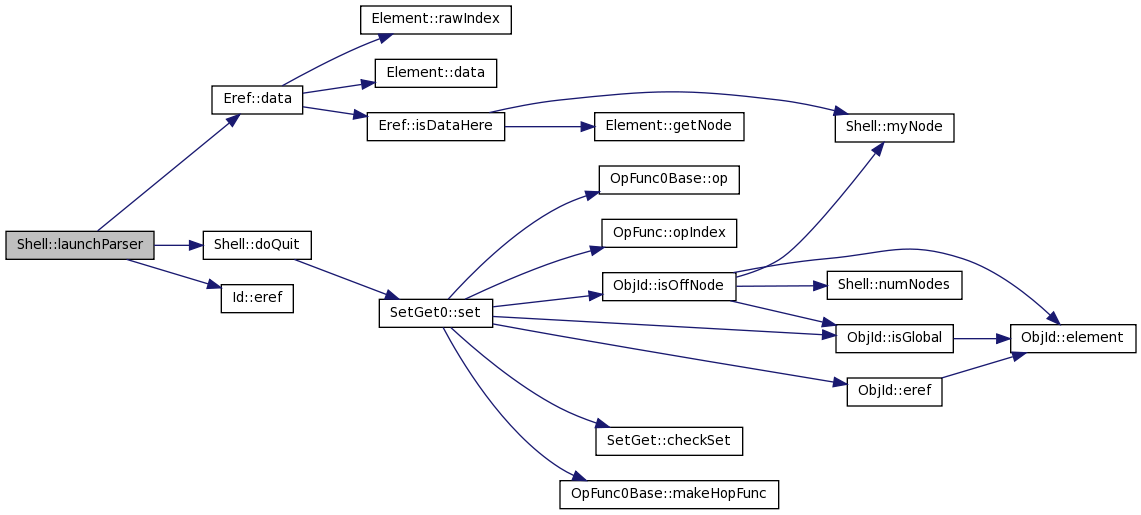
| static void Shell::launchThreads | ( | ) | [static] |
This function sets up the threading for the entire system. It creates all the worker threads and the threads for handling MPI and handling shell requests.
| void Shell::loadBalance | ( | ) | [static] |
Stub for eventual function to handle load balancing. This must be called to set up default groups.
Regular shell function that requires that the information about the hardware have been loaded in. For now the function just assigns SimGroups
Referenced by init().
| unsigned int Shell::myNode | ( | ) | [static] |
Referenced by MsgElement::getNode(), LocalDataElement::getNode(), GlobalDataElement::getNode(), FieldElement::getNumOnNode(), ObjId::isDataHere(), Eref::isDataHere(), ObjId::isOffNode(), main(), mooseMyNode(), nonMpiTests(), TestSched::process(), LocalDataElement::setDataSize(), testInterNodeOps(), and testShellParserStart().
| unsigned int Shell::numCores | ( | ) | [static] |
Referenced by nonMpiTests().
| unsigned int Shell::numNodes | ( | ) | [static] |
| static unsigned int Shell::numProcessThreads | ( | ) | [static] |
| static const ProcInfo* Shell::procInfo | ( | ) | [static] |
Static func for returning the ProcInfo of the shell.
| static unsigned int Shell::reduceInt | ( | unsigned int | val | ) | [static] |
Checks for highest 'val' on all nodes
| void Shell::setCwe | ( | ObjId | cwe | ) |
Assigns the current working Element of the Shell
Referenced by initCinfo(), and testTreeTraversal().
| void Shell::setHardware | ( | unsigned int | numCores, | |
| unsigned int | numNodes, | |||
| unsigned int | myNode | |||
| ) | [static] |
Assigns the hardware availability. Assumes that each node will have the same number of cores available.
Referenced by init(), and nonMpiTests().
| void Shell::start | ( | double | runTime | ) |
Sets of a simulation for duration runTime. Handles cases including single-thread, multithread, and multinode
| void Shell::waitForAck | ( | ) |
test for completion of request. This MUST be preceded by an initAck call.
| void Shell::warning | ( | const string & | text | ) |
Referenced by doMove().
Member Data Documentation
const unsigned int Shell::ErrorStatus = ~1 [static] |
const unsigned int Shell::OkStatus = ~0 [static] |
The documentation for this class was generated from the following files:
- shell/Shell.h
- shell/Shell.cpp
- shell/ShellThreads.cpp
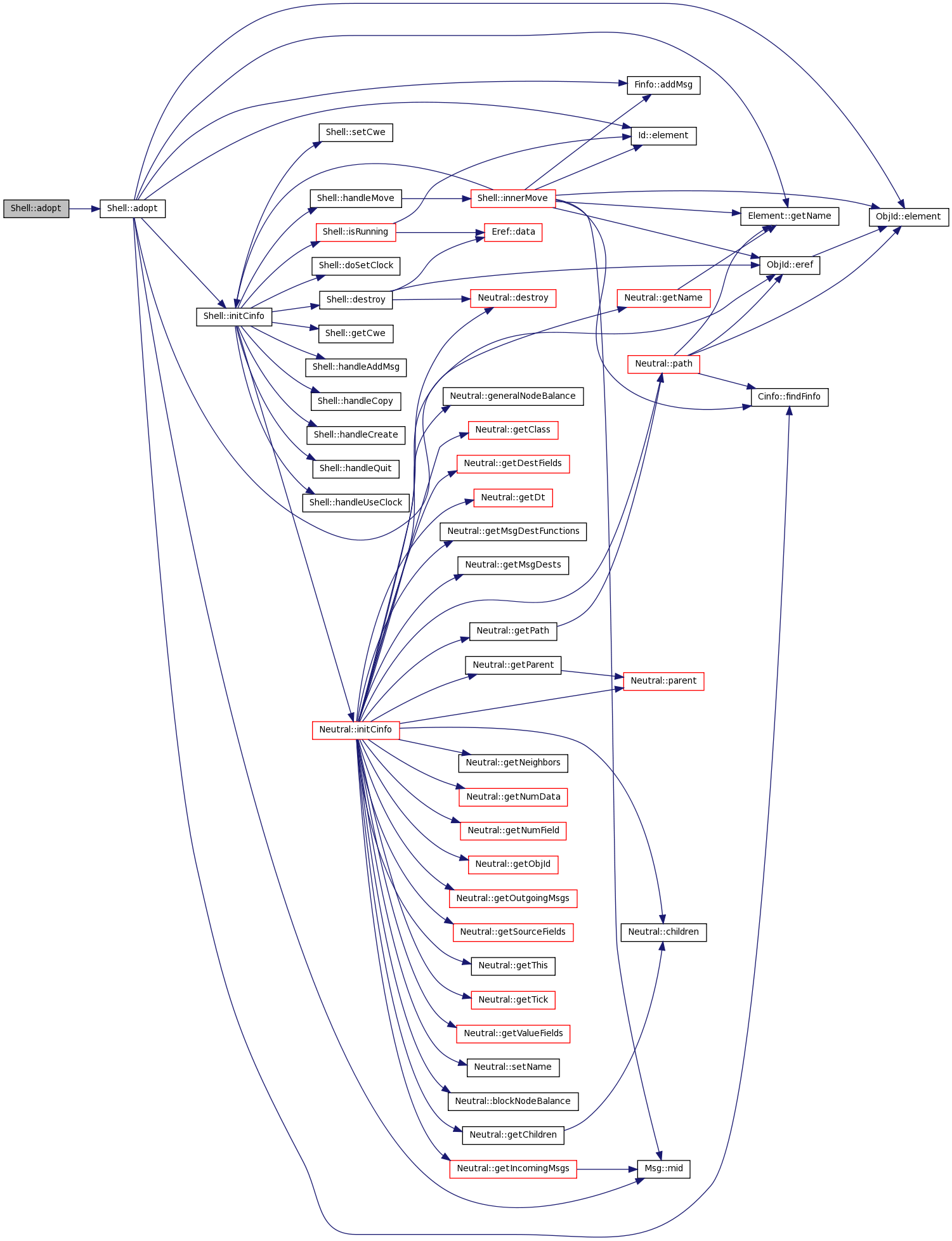
 1.6.1
1.6.1